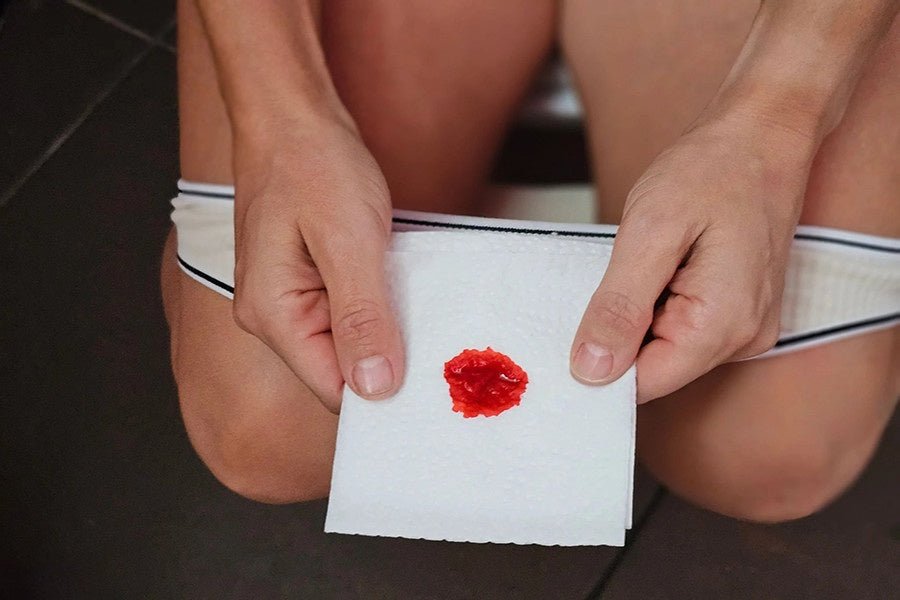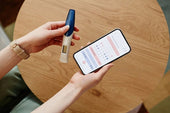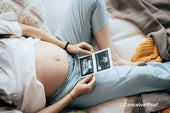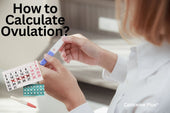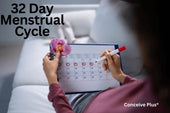Why Am I Not Ovulating but Having Periods?
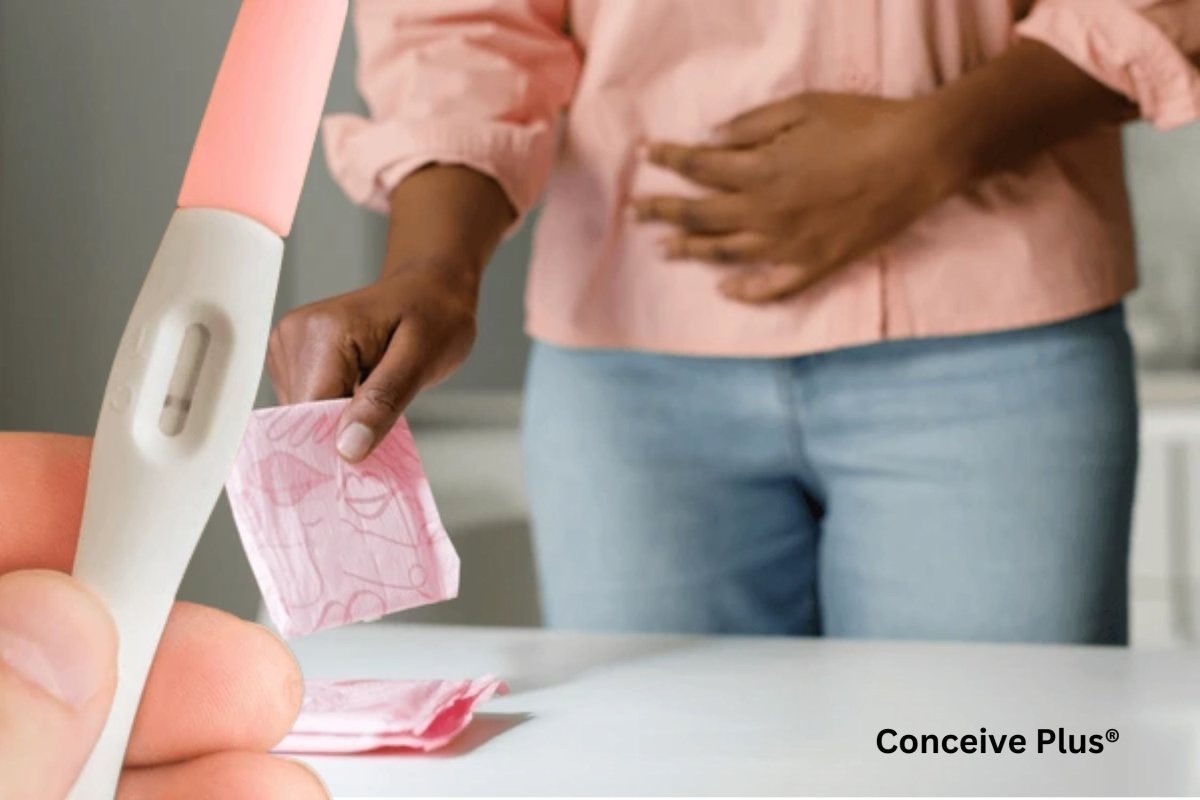
Many women find it confusing when they experience regular menstrual bleeding yet discover that ovulation is not occurring. This condition, known as anovulation, raises questions like why am I not ovulating but having periods?
Ovulation is the release of an egg from the ovary, which typically occurs once every menstrual cycle in females. A female menstrual cycle follows a pattern where ovulation occurs in the middle of the cycle, and bleeding or periods begin at the start of the next cycle [1].
So, not experiencing ovulation can make women ask questions like, can you get a period without ovulating, or can you have a period and not ovulate?
What Is Anovulation?
In simple terms, the anovulation definition is the failure of the ovary to release an egg during a menstrual cycle [2]. In a normal cycle, the ovaries release a mature egg that is ready to be fertilized by a sperm cell in the middle of the cycle. If fertilization and implantation of the egg occurs, pregnancy begins.
However, in women with an anovulatory cycle, there is a problem with the hormones that prepare and release the egg. This means no egg release happens throughout the menstrual cycle.
Since conception can't happen without ovulation, anovulation can be a significant concern for any woman, especially those who are trying to become pregnant.
What Causes Anovulation?
There are several causes of anovulation, and the exact cause can be different in your case. However, here are the common reasons for not ovulating in most women:
-
Hormonal Imbalances
Hormones like estrogen, progesterone, follicle-stimulating hormone (FSH), and luteinizing hormone (LH) regulate different events of the menstrual cycle, including ovulation [1]. It is the correct balance of these hormones that signals the body to initiate different events of the cycle.
For example, a surge of LH is required to stimulate the ovary for ovulation [1]. Thus, when there is an imbalance of these hormones, the chances of experiencing an anovulatory cycle increases.
-
Polycystic Ovary Syndrome
Studies show that polycystic ovary syndrome (PCOS) is one of the primary causes of anovulation [3]. PCOS causes women to experience sudden hormonal shifts and higher-than-normal levels of male hormones called androgens. This leads to irregular menstrual cycles and can prevent normal ovulation.
-
Thyroid Disorders
Studies show that thyroid hormones greatly influence the female menstrual cycle and overall fertility health [4]. Both types of thyroid conditions — hypothyroidism and hyperthyroidism — can disturb hormonal balance and interfere with ovulation. Thyroid conditions can also cause absence of periods in some cases.
-
High Prolactin Levels
Prolactin is a female hormone that is primarily important for milk production and breast development after childbirth. However, when prolactin levels are high, they can inhibit the hormones for ovulation, like FSH [5]. This can lead to the absence of ovulation and negatively impacts female fertility.
-
Lifestyle Factors
Different lifestyle factors, such as chronic stress, significant weight changes, excessive exercise, or a poor diet, can all contribute to hormonal imbalances and problems with menstrual regularity. Women with unhealthy lifestyles are more likely to experience anovulation and other fertility issues.
-
Age
Women are born with a limited quantity of eggs, which start to deplete after puberty. As a woman approaches menopause, the end of her reproductive journey, she is more likely to have irregular cycles. During this time, she may also experience cycles without ovulation. So, if you are older than 45 years and worried about why am I not ovulating, age can be the reason.
Signs and Symptoms of Anovulation
Recognizing anovulation symptoms or not ovulating symptoms early on can help with prompt diagnosis and effective treatment. However, not every woman experiencing anovulation will immediately notice the issue since period without ovulation signs aren't very clear in the beginning.
Here are some signs and symptoms of no ovulation that can help you detect this condition:
- Irregular Periods: Since anovulation is often due to problems with hormones, it also impacts menstrual regularities. Your cycles may last longer than usual, or you might even skip periods entirely.
- Abnormal Menstrual Flow: During an anovulatory cycle, you may experience either excessively heavy or unusually light bleeding. These changes in bleeding patterns raise questions like do you have to ovulate to have a period.
- Lack of Ovulation Pain: Reports show that about 40% of women feel pain during ovulation, which is also called Mittelschmerz [6]. If you normally feel pain during ovulation but suddenly don't, it could mean you're not ovulating.
- Stable Basal Body Temperature: The hormonal changes that trigger ovulation usually cause a slight rise in basal body temperature (BBT). Signs of not ovulating can include not experiencing clear mid-cycle temperature rise in your body.
- Changes in Cervical Mucus: Cervical mucus changes during ovulation and becomes clear, stretchy, like an egg white. A lack of these changes can be a part of signs you are not ovulating.
Other women may notice additional anovulatory cycle symptoms such as mood swings or fatigue. Paying attention to these hints and tracking your cycle closely can help answer the question: how can you tell if you have an anovulatory cycle?
Anovulatory Bleeding vs Period
Many women find it confusing to differentiate the bleeding in an anovulatory cycle from a normal period. A common question in such a case is, can you get your period without ovulating?
In cases of anovulation, the uterine lining may still build up and eventually shed, resulting in bleeding that might appear different from period blood. Here are some differences between anovulatory bleeding and normal period:
- Timing: In a normal ovulatory cycle, bleeding follows the release of an egg. In contrast, an anovulatory period does involve the release of an egg.
- Flow: The menstrual flow in an anovulatory period can be inconsistent. Sometimes it is lighter, and other times it may be heavier than usual. On the other hand, bleeding in a normal ovulatory cycle is usually consistent and lasts for three to five days.
Since the bleeding can occur both in the absence and presence of ovulation, it often leads to questions like, can you get period and not ovulate, or can you still have period and not ovulate?
As discussed above, experiencing periods doesn't guarantee ovulation, as it can also happen in anovulatory cycles. To detect ovulation, you need to look for more reliable signs of ovulation.
Treatment Options for Anovulation
If you are experiencing anovulatory cycles and wondering, I am not ovulating what can I do, there are treatment options available. Medical treatment and lifestyle modifications are effective anovulation treatment options.
-
Medical Treatments
Medical treatments that can help restore ovulation include:
- Hormonal Therapy: Drugs like Clomiphene citrate (Clomid) or Letrozole can stimulate ovulation by balancing the levels of reproductive hormones [7].
- Metformin: PCOS is strongly associated with insulin sensitivity. Metformin is a drug that helps improve insulin sensitivity and lower the symptoms of PCOS. This can promote hormonal balance and the release of eggs during ovulation.
- Gonadotropins: Gonadotrophins are injectable medications that mimic the role of natural fertility hormones in the body. They can stimulate the ovary to produce and release a mature egg.
- Thyroid Medication: If thyroid problems are the reason behind hormonal fluctuations and loss of ovulation, thyroid medications can help. These medications can restore normal thyroid hormone levels and help resume normal cycles.
-
Lifestyle Modifications
Healthy lifestyle habits can significantly improve female fertility health and help restore ovulation. These can include:
- Get a Balanced Diet: A balanced diet provides essential nutrients needed for healthy reproductive function, including regular menstrual cycles. Eating plenty of fruits, vegetables, and whole grains can help improve reproductive functioning and support ovulation [8].
- Maintain a Healthy Weight: Since both obesity and being underweight are among anovulation causes, it is essential to maintain a healthy weight. A healthy body weight promotes hormonal balance which, in turn, can restore normal ovulation.
- Stress Reduction: Chronic stress interferes with hormone production and increases your chances of experiencing anovulatory cycles. Some effective stress relieving ways that can help you improve fertility health and support regular ovulation include meditation, yoga, or counseling.
- Regular Exercise: Moderate physical activity helps maintain hormonal balance and is also beneficial for weight loss. Both hormonal balance and a healthy weight promote normal menstrual cycles with regular ovulation. However, refrain from excessive exercises as they can contribute to anovulation.
- Consider Fertility Supplements: Female fertility supplements, like Ovulation Support by Conceive Plus, can promote regular ovulation by improving hormonal balance. Nutrients like inositol and myo-inositol in fertility supplements help improve insulin sensitivity [9]. Improved insulin sensitivity can reduce anovulation in women with PCOS.
For those looking to better understand their ovulation and fertility cycles, exploring the best ovulation test can provide invaluable insights into when ovulation is occurring.
The Bottom Line
Experiencing periods without ovulation can be confusing for any woman, but it is not uncommon. This condition is called anovulation, and it can occur due to hormonal imbalances and different conditions like PCOS.
If you are also worried about why am I not ovulating but having periods, make sure to look for the signs of anovulation. Recognizing the signs and symptoms of not ovulating early on can help diagnose the underlying cause and improve treatment outcomes.
Treatment of anovulation is possible with healthy lifestyle changes, including eating a balanced diet and maintaining a healthy weight. If you don't experience improvement in menstrual regularity or skip ovulation even after lifestyle modifications, we recommend you consult your doctor for medical treatment options to restore ovulation.
FAQs
-
Do you ovulate every month?
A woman doesn't necessarily ovulate every month. Factors like stress, hormonal imbalances, and health conditions can cause anovulatory cycles, where ovulation doesn’t occur.
-
Can you have a period without ovulating?
It is possible that you experience period or menstrual bleeding without ovulating. This is because the uterine lining can develop even without ovulation and the shedding of this lining causes periods.
-
Do you get cramps during anovulatory cycle?
You can get cramps during an anovulatory cycle, even though no ovulation occurs. These cramps are often distinguishable from normal period cramps and are caused by hormonal fluctuations.
Resources Used
- Thiyagarajan, D. K., Basit, H., & Jeanmonod, R. (2024b, September 27). Physiology, menstrual cycle. StatPearls - NCBI Bookshelf. https://www.ncbi.nlm.nih.gov/books/NBK500020/
- Hamilton-Fairley, D., & Taylor, A. (2003). Anovulation. BMJ, 327(7414), 546–549. https://doi.org/10.1136/bmj.327.7414.546
- Franks, S., & Hardy, K. (2020). What causes anovulation in polycystic ovary syndrome? Current Opinion in Endocrine and Metabolic Research, 12, 59-65. https://doi.org/10.1016/j.coemr.2020.03.001
- Mazzilli, R., Medenica, S., Di Tommaso, A. M., Fabozzi, G., Zamponi, V., Cimadomo, D., Rienzi, L., Ubaldi, F. M., Watanabe, M., Faggiano, A., La Vignera, S., & Defeudis, G. (2022). The role of thyroid function in female and male infertility: a narrative review. Journal of Endocrinological Investigation, 46(1), 15–26. https://doi.org/10.1007/s40618-022-01883-7
- Prolactin inhibits ovulation and thus decreases risk of incident endometriosis. (2025, March 27). The BMJ. https://www.bmj.com/content/358/bmj.j3778/rr
- Mittelschmerz. (2025, January 1). PubMed. https://pubmed.ncbi.nlm.nih.gov/31747229/
- Wasim, T., Nasrin, T., Zunair, J., & Irshad, S. (2023). Efficacy of Letrozole vs Clomiphene Citrate for induction of ovulation in women with polycystic ovarian syndrome. Pakistan Journal of Medical Sciences, 40(1). https://doi.org/10.12669/pjms.40.1.7971
- Skoracka, K., Ratajczak, A. E., Rychter, A. M., Dobrowolska, A., & Krela-Kaźmierczak, I. (2021c). Female fertility and the nutritional approach: the most essential aspects. Advances in Nutrition, 12(6), 2372–2386. https://doi.org/10.1093/advances/nmab068
- DiNicolantonio, J. J., & O’Keefe, J. H. (2022). Myo-inositol for insulin resistance, metabolic syndrome, polycystic ovary syndrome and gestational diabetes. Open Heart, 9(1), e001989. https://doi.org/10.1136/openhrt-2022-001989
Conceive Plus is the best place to buy myo-inositol online for the best myo-inositol supplements Conceive Plus Ovulation Support contains premium myo-inositol for sale. Order myo-inositol capsules online today to boost your ovulation and regulate hormones and menstrual cycles.




